The Role of Emotional Intelligence in Leadership: LB5205 Essay
VerifiedAdded on 2023/03/23
|9
|2465
|62
Essay
AI Summary
This essay delves into the multifaceted concept of emotional intelligence and its critical role in effective leadership. It begins by defining emotional intelligence and its various components, including self-awareness, self-regulation, motivation, empathy, and social skills. The essay then reflects on how these skills contribute to personal and career development, emphasizing the importance of balancing emotions for transformational leadership. It explores how self-awareness helps leaders understand their emotions, while self-regulation enables them to manage their responses in challenging situations. The essay also highlights the significance of motivation, empathy, and social skills in fostering strong relationships and creating positive changes within teams. Furthermore, it discusses the practical application of emotional intelligence in the workplace, emphasizing the need for emotional balance and the development of social competencies. Finally, the essay concludes by outlining the future career aspirations of the author, focusing on the integration of emotional intelligence to create a mindful and impactful leadership style.
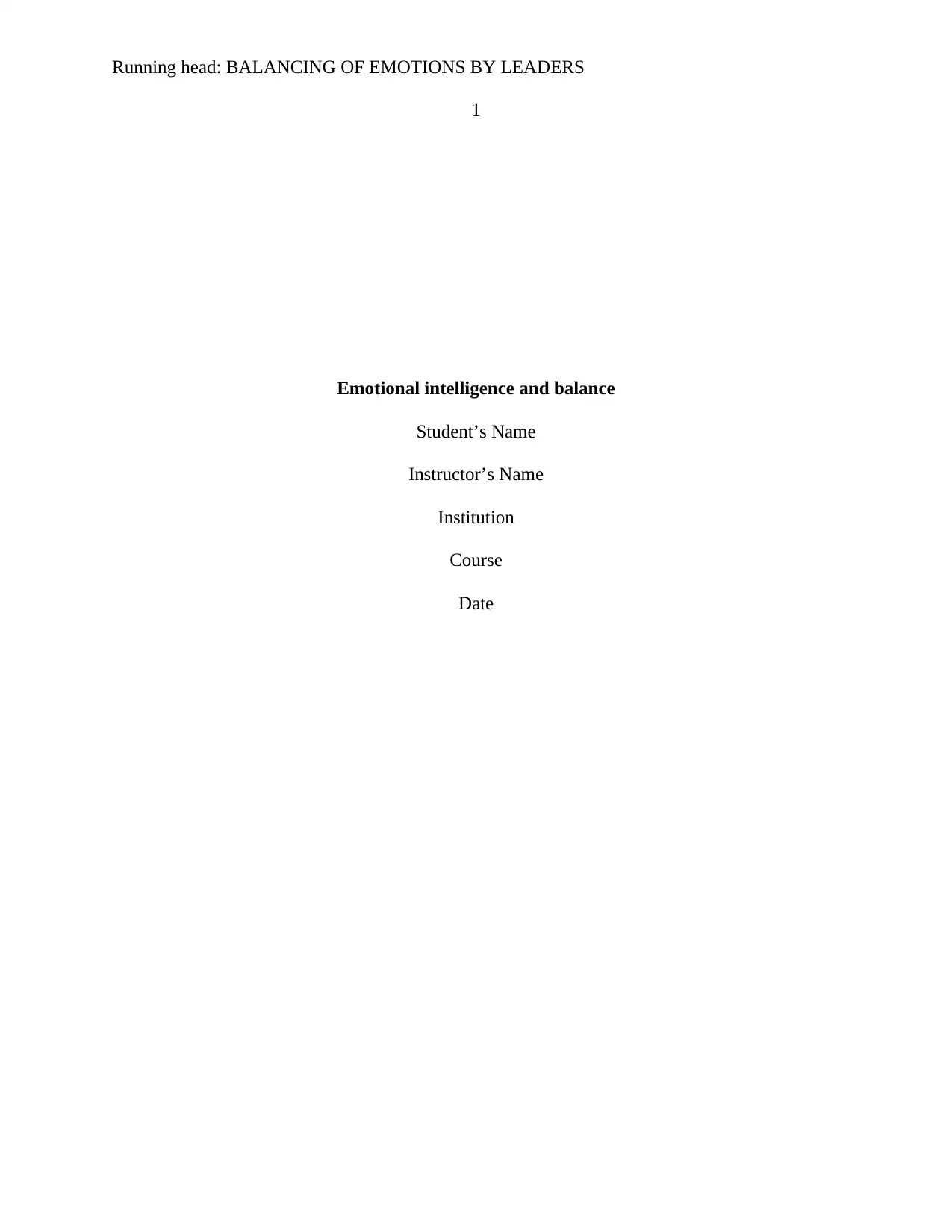
Running head: BALANCING OF EMOTIONS BY LEADERS
1
Emotional intelligence and balance
Student’s Name
Instructor’s Name
Institution
Course
Date
1
Emotional intelligence and balance
Student’s Name
Instructor’s Name
Institution
Course
Date
Paraphrase This Document
Need a fresh take? Get an instant paraphrase of this document with our AI Paraphraser
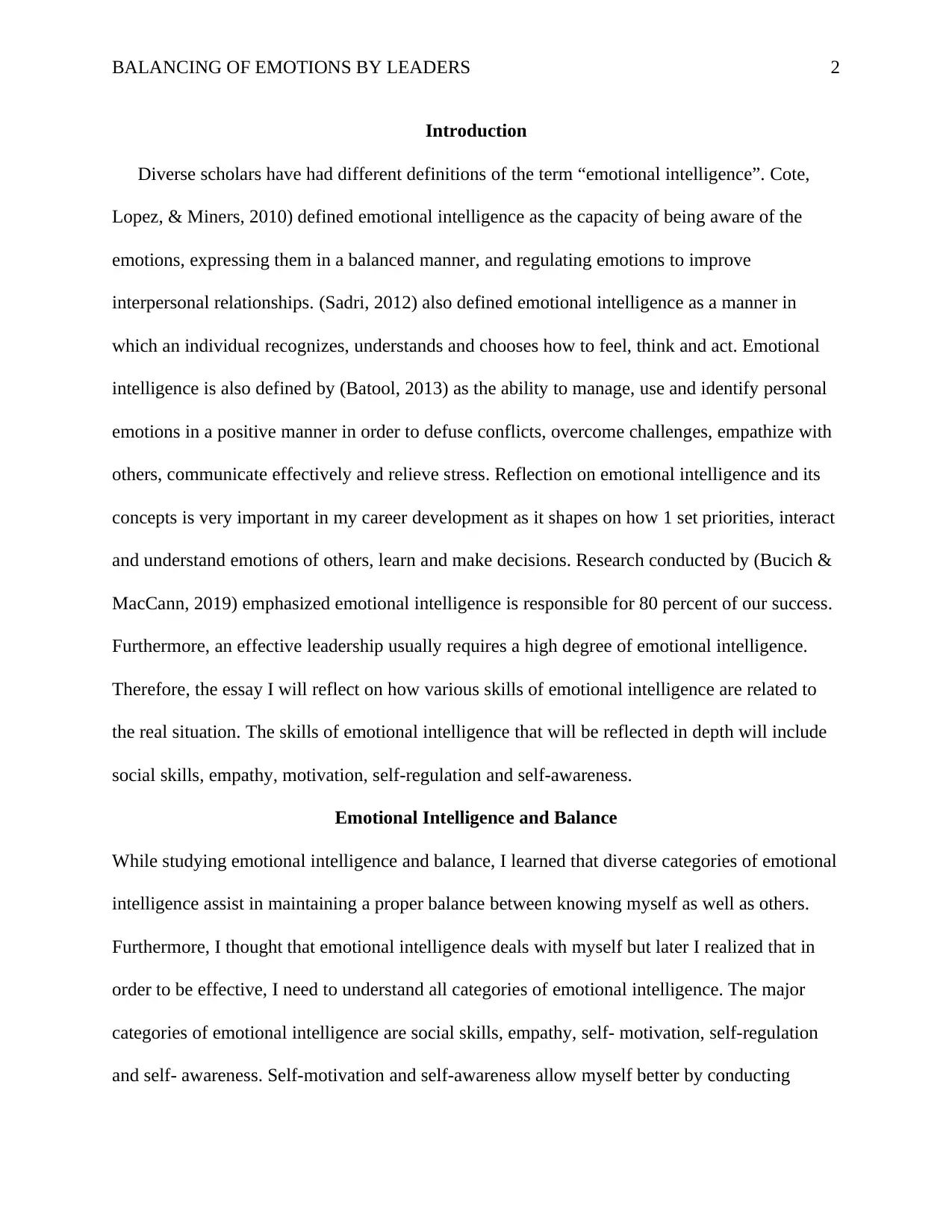
BALANCING OF EMOTIONS BY LEADERS 2
Introduction
Diverse scholars have had different definitions of the term “emotional intelligence”. Cote,
Lopez, & Miners, 2010) defined emotional intelligence as the capacity of being aware of the
emotions, expressing them in a balanced manner, and regulating emotions to improve
interpersonal relationships. (Sadri, 2012) also defined emotional intelligence as a manner in
which an individual recognizes, understands and chooses how to feel, think and act. Emotional
intelligence is also defined by (Batool, 2013) as the ability to manage, use and identify personal
emotions in a positive manner in order to defuse conflicts, overcome challenges, empathize with
others, communicate effectively and relieve stress. Reflection on emotional intelligence and its
concepts is very important in my career development as it shapes on how 1 set priorities, interact
and understand emotions of others, learn and make decisions. Research conducted by (Bucich &
MacCann, 2019) emphasized emotional intelligence is responsible for 80 percent of our success.
Furthermore, an effective leadership usually requires a high degree of emotional intelligence.
Therefore, the essay I will reflect on how various skills of emotional intelligence are related to
the real situation. The skills of emotional intelligence that will be reflected in depth will include
social skills, empathy, motivation, self-regulation and self-awareness.
Emotional Intelligence and Balance
While studying emotional intelligence and balance, I learned that diverse categories of emotional
intelligence assist in maintaining a proper balance between knowing myself as well as others.
Furthermore, I thought that emotional intelligence deals with myself but later I realized that in
order to be effective, I need to understand all categories of emotional intelligence. The major
categories of emotional intelligence are social skills, empathy, self- motivation, self-regulation
and self- awareness. Self-motivation and self-awareness allow myself better by conducting
Introduction
Diverse scholars have had different definitions of the term “emotional intelligence”. Cote,
Lopez, & Miners, 2010) defined emotional intelligence as the capacity of being aware of the
emotions, expressing them in a balanced manner, and regulating emotions to improve
interpersonal relationships. (Sadri, 2012) also defined emotional intelligence as a manner in
which an individual recognizes, understands and chooses how to feel, think and act. Emotional
intelligence is also defined by (Batool, 2013) as the ability to manage, use and identify personal
emotions in a positive manner in order to defuse conflicts, overcome challenges, empathize with
others, communicate effectively and relieve stress. Reflection on emotional intelligence and its
concepts is very important in my career development as it shapes on how 1 set priorities, interact
and understand emotions of others, learn and make decisions. Research conducted by (Bucich &
MacCann, 2019) emphasized emotional intelligence is responsible for 80 percent of our success.
Furthermore, an effective leadership usually requires a high degree of emotional intelligence.
Therefore, the essay I will reflect on how various skills of emotional intelligence are related to
the real situation. The skills of emotional intelligence that will be reflected in depth will include
social skills, empathy, motivation, self-regulation and self-awareness.
Emotional Intelligence and Balance
While studying emotional intelligence and balance, I learned that diverse categories of emotional
intelligence assist in maintaining a proper balance between knowing myself as well as others.
Furthermore, I thought that emotional intelligence deals with myself but later I realized that in
order to be effective, I need to understand all categories of emotional intelligence. The major
categories of emotional intelligence are social skills, empathy, self- motivation, self-regulation
and self- awareness. Self-motivation and self-awareness allow myself better by conducting
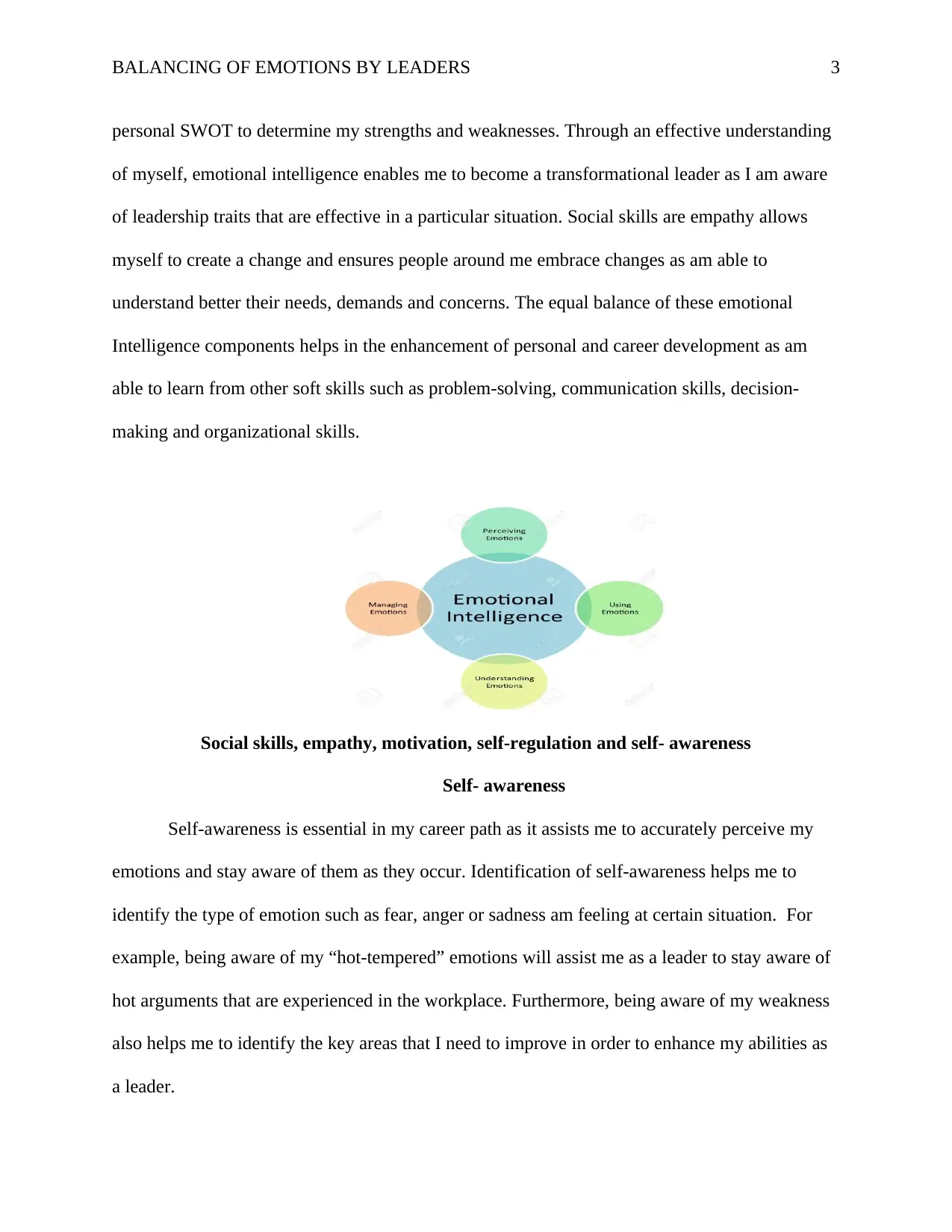
BALANCING OF EMOTIONS BY LEADERS 3
personal SWOT to determine my strengths and weaknesses. Through an effective understanding
of myself, emotional intelligence enables me to become a transformational leader as I am aware
of leadership traits that are effective in a particular situation. Social skills are empathy allows
myself to create a change and ensures people around me embrace changes as am able to
understand better their needs, demands and concerns. The equal balance of these emotional
Intelligence components helps in the enhancement of personal and career development as am
able to learn from other soft skills such as problem-solving, communication skills, decision-
making and organizational skills.
Social skills, empathy, motivation, self-regulation and self- awareness
Self- awareness
Self-awareness is essential in my career path as it assists me to accurately perceive my
emotions and stay aware of them as they occur. Identification of self-awareness helps me to
identify the type of emotion such as fear, anger or sadness am feeling at certain situation. For
example, being aware of my “hot-tempered” emotions will assist me as a leader to stay aware of
hot arguments that are experienced in the workplace. Furthermore, being aware of my weakness
also helps me to identify the key areas that I need to improve in order to enhance my abilities as
a leader.
personal SWOT to determine my strengths and weaknesses. Through an effective understanding
of myself, emotional intelligence enables me to become a transformational leader as I am aware
of leadership traits that are effective in a particular situation. Social skills are empathy allows
myself to create a change and ensures people around me embrace changes as am able to
understand better their needs, demands and concerns. The equal balance of these emotional
Intelligence components helps in the enhancement of personal and career development as am
able to learn from other soft skills such as problem-solving, communication skills, decision-
making and organizational skills.
Social skills, empathy, motivation, self-regulation and self- awareness
Self- awareness
Self-awareness is essential in my career path as it assists me to accurately perceive my
emotions and stay aware of them as they occur. Identification of self-awareness helps me to
identify the type of emotion such as fear, anger or sadness am feeling at certain situation. For
example, being aware of my “hot-tempered” emotions will assist me as a leader to stay aware of
hot arguments that are experienced in the workplace. Furthermore, being aware of my weakness
also helps me to identify the key areas that I need to improve in order to enhance my abilities as
a leader.
⊘ This is a preview!⊘
Do you want full access?
Subscribe today to unlock all pages.

Trusted by 1+ million students worldwide
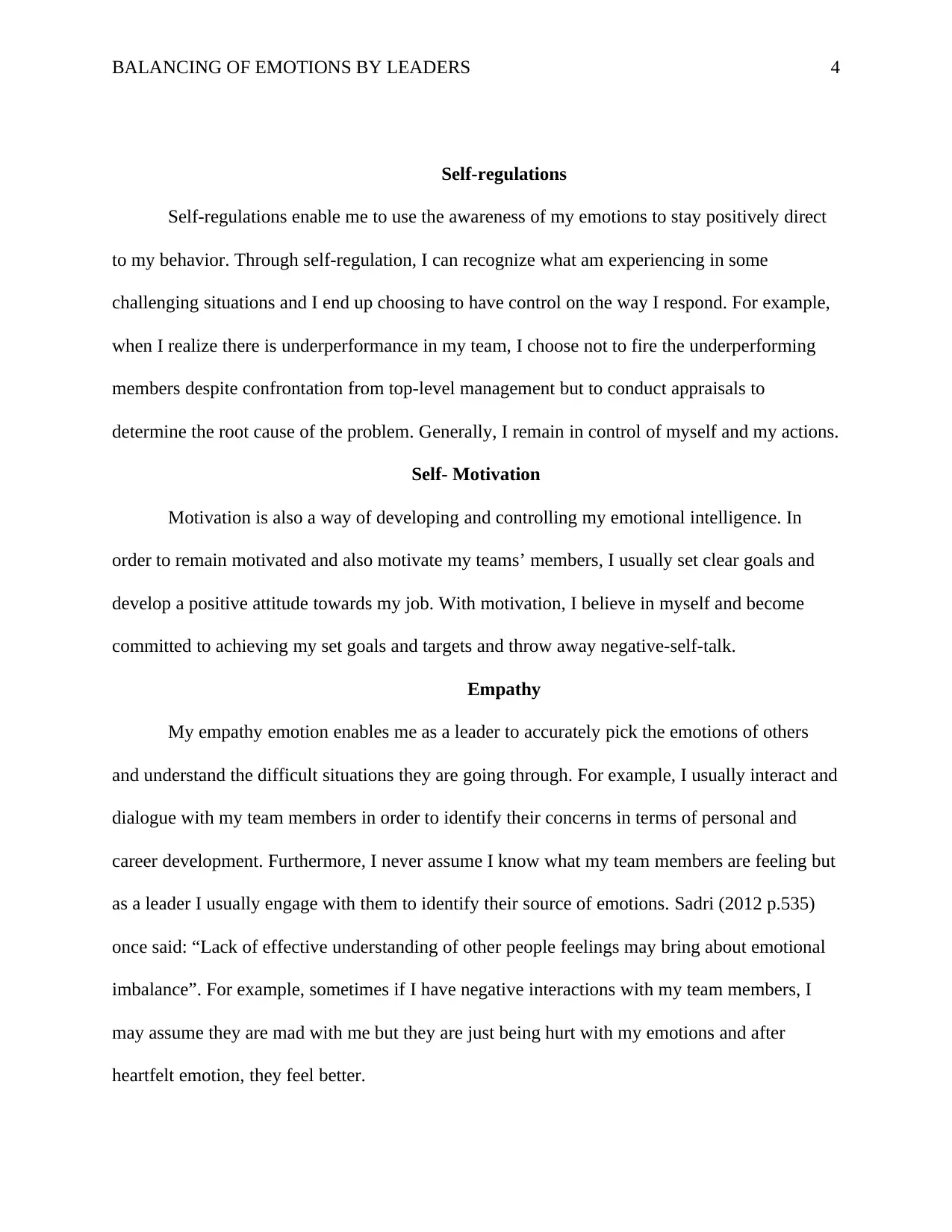
BALANCING OF EMOTIONS BY LEADERS 4
Self-regulations
Self-regulations enable me to use the awareness of my emotions to stay positively direct
to my behavior. Through self-regulation, I can recognize what am experiencing in some
challenging situations and I end up choosing to have control on the way I respond. For example,
when I realize there is underperformance in my team, I choose not to fire the underperforming
members despite confrontation from top-level management but to conduct appraisals to
determine the root cause of the problem. Generally, I remain in control of myself and my actions.
Self- Motivation
Motivation is also a way of developing and controlling my emotional intelligence. In
order to remain motivated and also motivate my teams’ members, I usually set clear goals and
develop a positive attitude towards my job. With motivation, I believe in myself and become
committed to achieving my set goals and targets and throw away negative-self-talk.
Empathy
My empathy emotion enables me as a leader to accurately pick the emotions of others
and understand the difficult situations they are going through. For example, I usually interact and
dialogue with my team members in order to identify their concerns in terms of personal and
career development. Furthermore, I never assume I know what my team members are feeling but
as a leader I usually engage with them to identify their source of emotions. Sadri (2012 p.535)
once said: “Lack of effective understanding of other people feelings may bring about emotional
imbalance”. For example, sometimes if I have negative interactions with my team members, I
may assume they are mad with me but they are just being hurt with my emotions and after
heartfelt emotion, they feel better.
Self-regulations
Self-regulations enable me to use the awareness of my emotions to stay positively direct
to my behavior. Through self-regulation, I can recognize what am experiencing in some
challenging situations and I end up choosing to have control on the way I respond. For example,
when I realize there is underperformance in my team, I choose not to fire the underperforming
members despite confrontation from top-level management but to conduct appraisals to
determine the root cause of the problem. Generally, I remain in control of myself and my actions.
Self- Motivation
Motivation is also a way of developing and controlling my emotional intelligence. In
order to remain motivated and also motivate my teams’ members, I usually set clear goals and
develop a positive attitude towards my job. With motivation, I believe in myself and become
committed to achieving my set goals and targets and throw away negative-self-talk.
Empathy
My empathy emotion enables me as a leader to accurately pick the emotions of others
and understand the difficult situations they are going through. For example, I usually interact and
dialogue with my team members in order to identify their concerns in terms of personal and
career development. Furthermore, I never assume I know what my team members are feeling but
as a leader I usually engage with them to identify their source of emotions. Sadri (2012 p.535)
once said: “Lack of effective understanding of other people feelings may bring about emotional
imbalance”. For example, sometimes if I have negative interactions with my team members, I
may assume they are mad with me but they are just being hurt with my emotions and after
heartfelt emotion, they feel better.
Paraphrase This Document
Need a fresh take? Get an instant paraphrase of this document with our AI Paraphraser
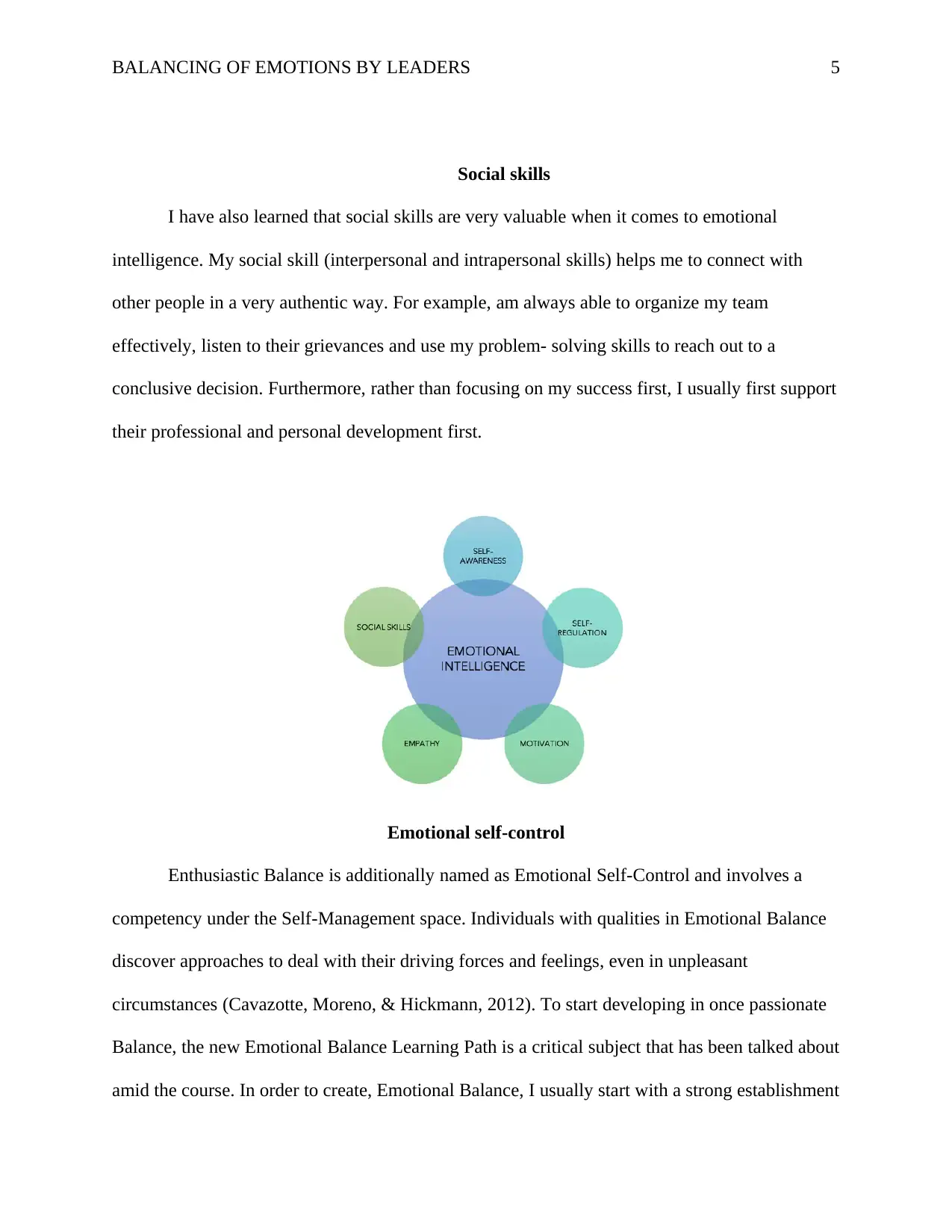
BALANCING OF EMOTIONS BY LEADERS 5
Social skills
I have also learned that social skills are very valuable when it comes to emotional
intelligence. My social skill (interpersonal and intrapersonal skills) helps me to connect with
other people in a very authentic way. For example, am always able to organize my team
effectively, listen to their grievances and use my problem- solving skills to reach out to a
conclusive decision. Furthermore, rather than focusing on my success first, I usually first support
their professional and personal development first.
Emotional self-control
Enthusiastic Balance is additionally named as Emotional Self-Control and involves a
competency under the Self-Management space. Individuals with qualities in Emotional Balance
discover approaches to deal with their driving forces and feelings, even in unpleasant
circumstances (Cavazotte, Moreno, & Hickmann, 2012). To start developing in once passionate
Balance, the new Emotional Balance Learning Path is a critical subject that has been talked about
amid the course. In order to create, Emotional Balance, I usually start with a strong establishment
Social skills
I have also learned that social skills are very valuable when it comes to emotional
intelligence. My social skill (interpersonal and intrapersonal skills) helps me to connect with
other people in a very authentic way. For example, am always able to organize my team
effectively, listen to their grievances and use my problem- solving skills to reach out to a
conclusive decision. Furthermore, rather than focusing on my success first, I usually first support
their professional and personal development first.
Emotional self-control
Enthusiastic Balance is additionally named as Emotional Self-Control and involves a
competency under the Self-Management space. Individuals with qualities in Emotional Balance
discover approaches to deal with their driving forces and feelings, even in unpleasant
circumstances (Cavazotte, Moreno, & Hickmann, 2012). To start developing in once passionate
Balance, the new Emotional Balance Learning Path is a critical subject that has been talked about
amid the course. In order to create, Emotional Balance, I usually start with a strong establishment
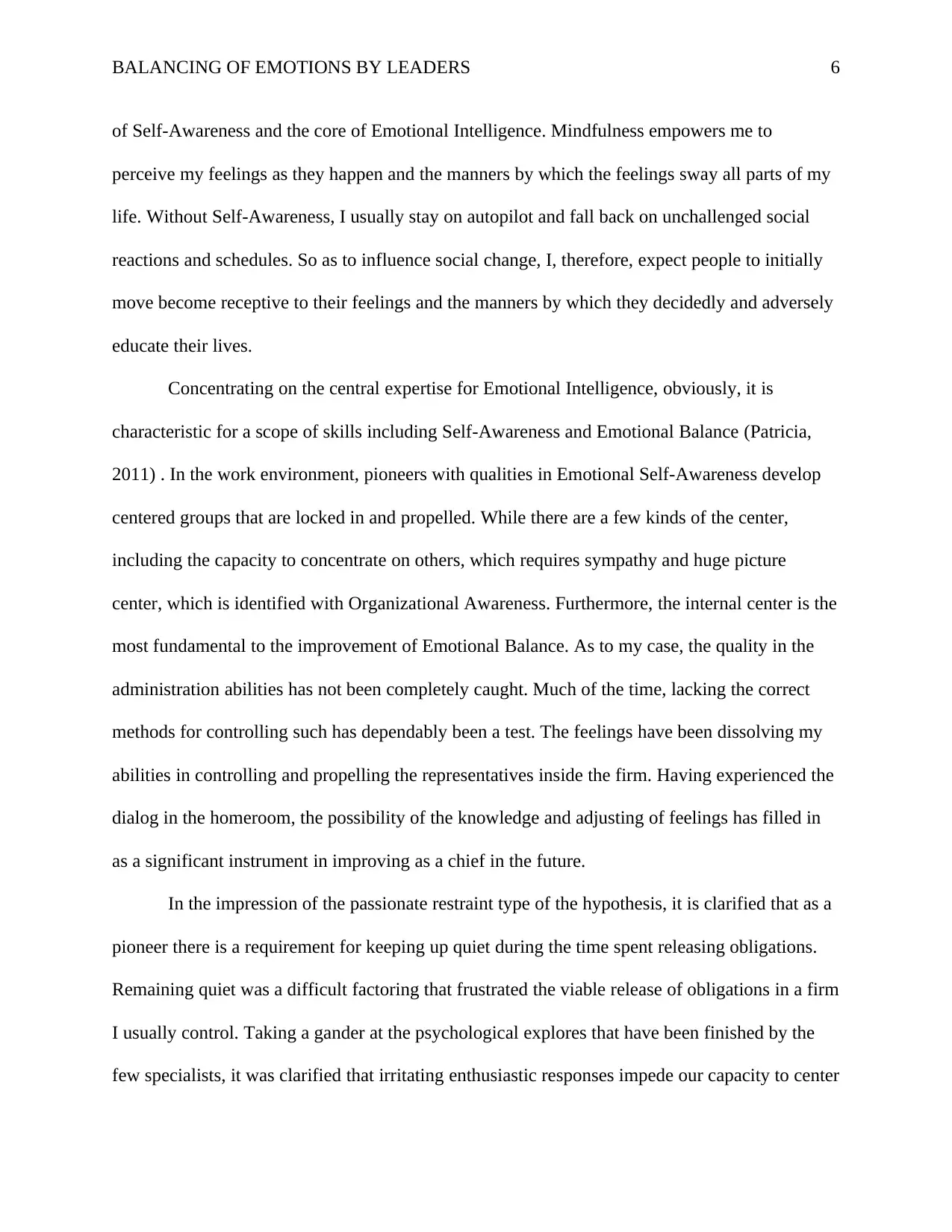
BALANCING OF EMOTIONS BY LEADERS 6
of Self-Awareness and the core of Emotional Intelligence. Mindfulness empowers me to
perceive my feelings as they happen and the manners by which the feelings sway all parts of my
life. Without Self-Awareness, I usually stay on autopilot and fall back on unchallenged social
reactions and schedules. So as to influence social change, I, therefore, expect people to initially
move become receptive to their feelings and the manners by which they decidedly and adversely
educate their lives.
Concentrating on the central expertise for Emotional Intelligence, obviously, it is
characteristic for a scope of skills including Self-Awareness and Emotional Balance (Patricia,
2011) . In the work environment, pioneers with qualities in Emotional Self-Awareness develop
centered groups that are locked in and propelled. While there are a few kinds of the center,
including the capacity to concentrate on others, which requires sympathy and huge picture
center, which is identified with Organizational Awareness. Furthermore, the internal center is the
most fundamental to the improvement of Emotional Balance. As to my case, the quality in the
administration abilities has not been completely caught. Much of the time, lacking the correct
methods for controlling such has dependably been a test. The feelings have been dissolving my
abilities in controlling and propelling the representatives inside the firm. Having experienced the
dialog in the homeroom, the possibility of the knowledge and adjusting of feelings has filled in
as a significant instrument in improving as a chief in the future.
In the impression of the passionate restraint type of the hypothesis, it is clarified that as a
pioneer there is a requirement for keeping up quiet during the time spent releasing obligations.
Remaining quiet was a difficult factoring that frustrated the viable release of obligations in a firm
I usually control. Taking a gander at the psychological explores that have been finished by the
few specialists, it was clarified that irritating enthusiastic responses impede our capacity to center
of Self-Awareness and the core of Emotional Intelligence. Mindfulness empowers me to
perceive my feelings as they happen and the manners by which the feelings sway all parts of my
life. Without Self-Awareness, I usually stay on autopilot and fall back on unchallenged social
reactions and schedules. So as to influence social change, I, therefore, expect people to initially
move become receptive to their feelings and the manners by which they decidedly and adversely
educate their lives.
Concentrating on the central expertise for Emotional Intelligence, obviously, it is
characteristic for a scope of skills including Self-Awareness and Emotional Balance (Patricia,
2011) . In the work environment, pioneers with qualities in Emotional Self-Awareness develop
centered groups that are locked in and propelled. While there are a few kinds of the center,
including the capacity to concentrate on others, which requires sympathy and huge picture
center, which is identified with Organizational Awareness. Furthermore, the internal center is the
most fundamental to the improvement of Emotional Balance. As to my case, the quality in the
administration abilities has not been completely caught. Much of the time, lacking the correct
methods for controlling such has dependably been a test. The feelings have been dissolving my
abilities in controlling and propelling the representatives inside the firm. Having experienced the
dialog in the homeroom, the possibility of the knowledge and adjusting of feelings has filled in
as a significant instrument in improving as a chief in the future.
In the impression of the passionate restraint type of the hypothesis, it is clarified that as a
pioneer there is a requirement for keeping up quiet during the time spent releasing obligations.
Remaining quiet was a difficult factoring that frustrated the viable release of obligations in a firm
I usually control. Taking a gander at the psychological explores that have been finished by the
few specialists, it was clarified that irritating enthusiastic responses impede our capacity to center
⊘ This is a preview!⊘
Do you want full access?
Subscribe today to unlock all pages.

Trusted by 1+ million students worldwide
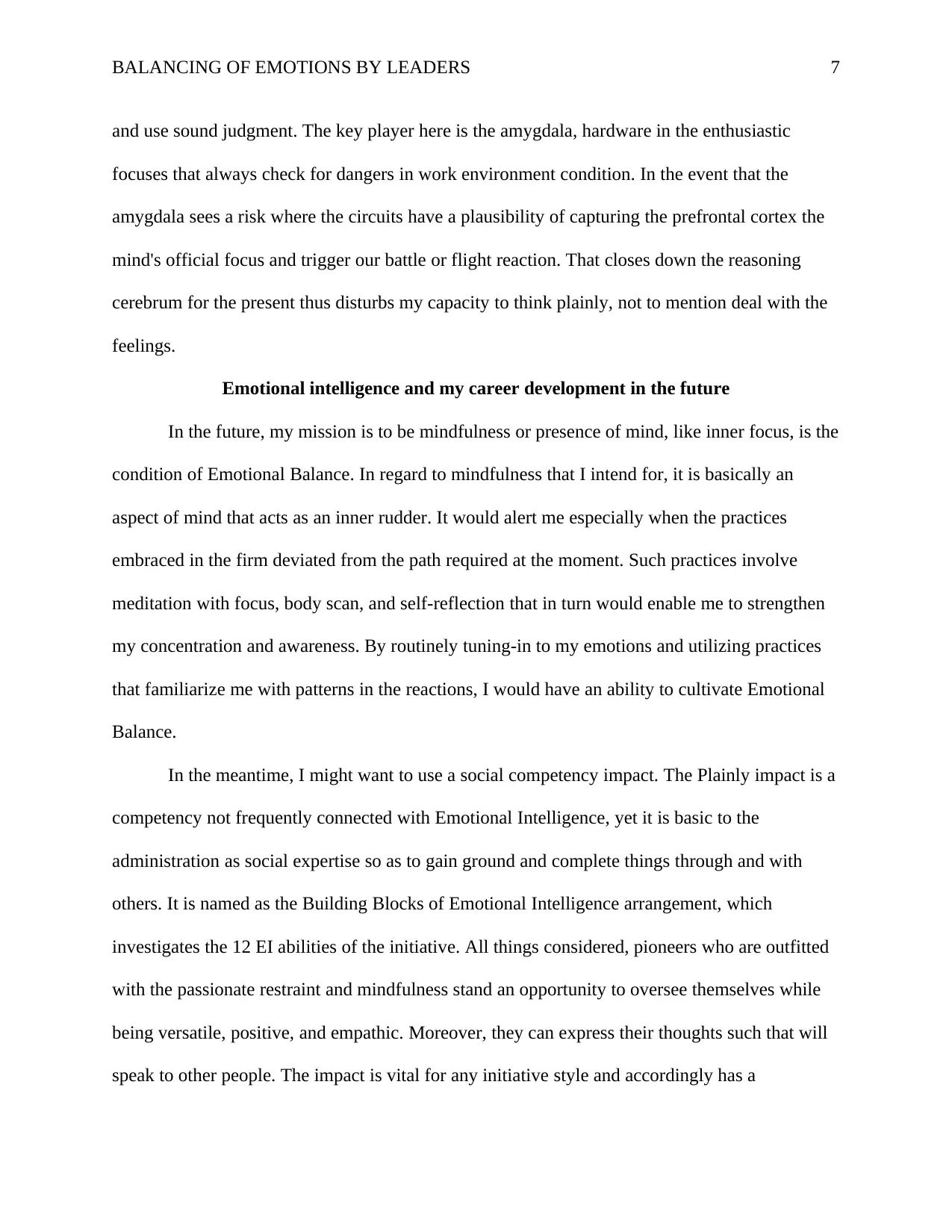
BALANCING OF EMOTIONS BY LEADERS 7
and use sound judgment. The key player here is the amygdala, hardware in the enthusiastic
focuses that always check for dangers in work environment condition. In the event that the
amygdala sees a risk where the circuits have a plausibility of capturing the prefrontal cortex the
mind's official focus and trigger our battle or flight reaction. That closes down the reasoning
cerebrum for the present thus disturbs my capacity to think plainly, not to mention deal with the
feelings.
Emotional intelligence and my career development in the future
In the future, my mission is to be mindfulness or presence of mind, like inner focus, is the
condition of Emotional Balance. In regard to mindfulness that I intend for, it is basically an
aspect of mind that acts as an inner rudder. It would alert me especially when the practices
embraced in the firm deviated from the path required at the moment. Such practices involve
meditation with focus, body scan, and self-reflection that in turn would enable me to strengthen
my concentration and awareness. By routinely tuning-in to my emotions and utilizing practices
that familiarize me with patterns in the reactions, I would have an ability to cultivate Emotional
Balance.
In the meantime, I might want to use a social competency impact. The Plainly impact is a
competency not frequently connected with Emotional Intelligence, yet it is basic to the
administration as social expertise so as to gain ground and complete things through and with
others. It is named as the Building Blocks of Emotional Intelligence arrangement, which
investigates the 12 EI abilities of the initiative. All things considered, pioneers who are outfitted
with the passionate restraint and mindfulness stand an opportunity to oversee themselves while
being versatile, positive, and empathic. Moreover, they can express their thoughts such that will
speak to other people. The impact is vital for any initiative style and accordingly has a
and use sound judgment. The key player here is the amygdala, hardware in the enthusiastic
focuses that always check for dangers in work environment condition. In the event that the
amygdala sees a risk where the circuits have a plausibility of capturing the prefrontal cortex the
mind's official focus and trigger our battle or flight reaction. That closes down the reasoning
cerebrum for the present thus disturbs my capacity to think plainly, not to mention deal with the
feelings.
Emotional intelligence and my career development in the future
In the future, my mission is to be mindfulness or presence of mind, like inner focus, is the
condition of Emotional Balance. In regard to mindfulness that I intend for, it is basically an
aspect of mind that acts as an inner rudder. It would alert me especially when the practices
embraced in the firm deviated from the path required at the moment. Such practices involve
meditation with focus, body scan, and self-reflection that in turn would enable me to strengthen
my concentration and awareness. By routinely tuning-in to my emotions and utilizing practices
that familiarize me with patterns in the reactions, I would have an ability to cultivate Emotional
Balance.
In the meantime, I might want to use a social competency impact. The Plainly impact is a
competency not frequently connected with Emotional Intelligence, yet it is basic to the
administration as social expertise so as to gain ground and complete things through and with
others. It is named as the Building Blocks of Emotional Intelligence arrangement, which
investigates the 12 EI abilities of the initiative. All things considered, pioneers who are outfitted
with the passionate restraint and mindfulness stand an opportunity to oversee themselves while
being versatile, positive, and empathic. Moreover, they can express their thoughts such that will
speak to other people. The impact is vital for any initiative style and accordingly has a
Paraphrase This Document
Need a fresh take? Get an instant paraphrase of this document with our AI Paraphraser
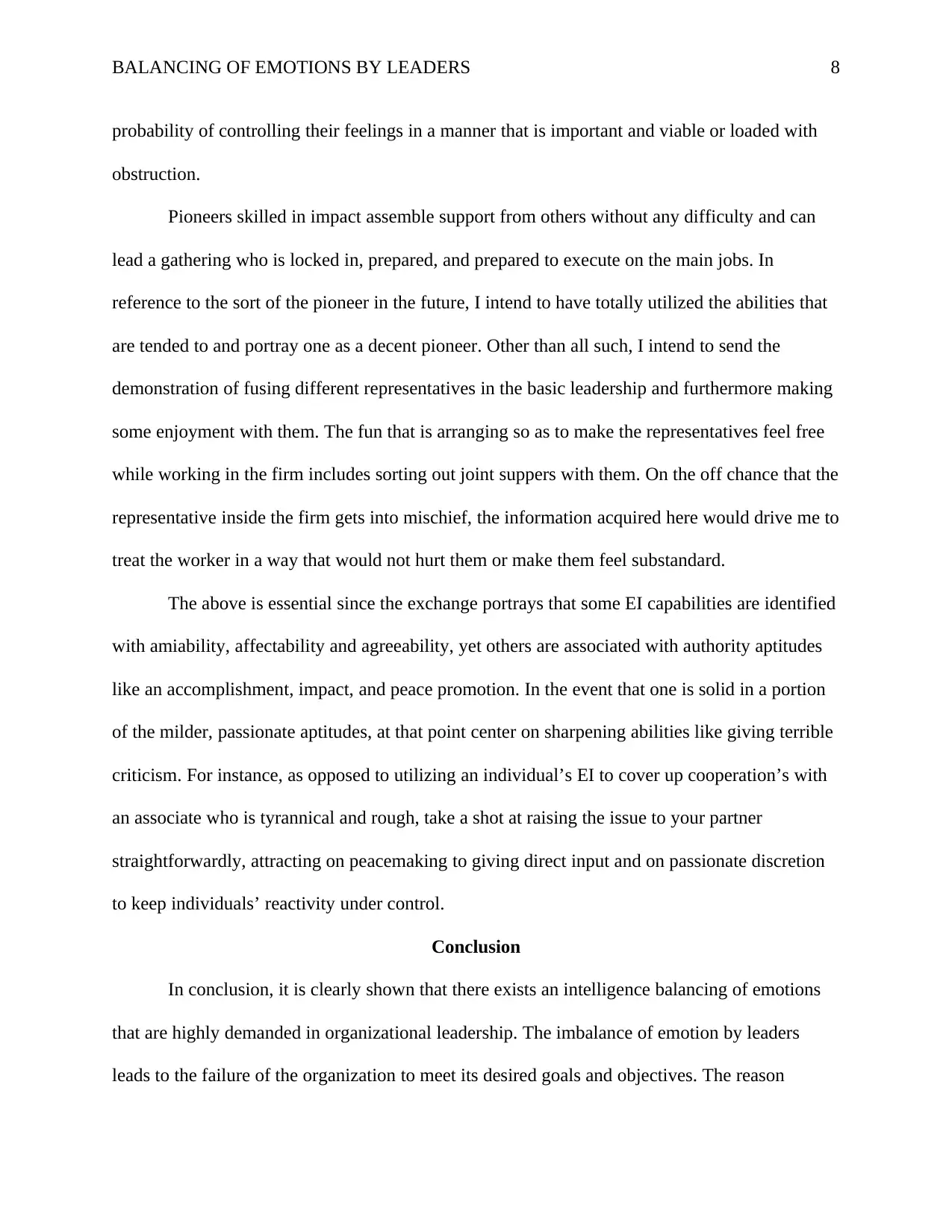
BALANCING OF EMOTIONS BY LEADERS 8
probability of controlling their feelings in a manner that is important and viable or loaded with
obstruction.
Pioneers skilled in impact assemble support from others without any difficulty and can
lead a gathering who is locked in, prepared, and prepared to execute on the main jobs. In
reference to the sort of the pioneer in the future, I intend to have totally utilized the abilities that
are tended to and portray one as a decent pioneer. Other than all such, I intend to send the
demonstration of fusing different representatives in the basic leadership and furthermore making
some enjoyment with them. The fun that is arranging so as to make the representatives feel free
while working in the firm includes sorting out joint suppers with them. On the off chance that the
representative inside the firm gets into mischief, the information acquired here would drive me to
treat the worker in a way that would not hurt them or make them feel substandard.
The above is essential since the exchange portrays that some EI capabilities are identified
with amiability, affectability and agreeability, yet others are associated with authority aptitudes
like an accomplishment, impact, and peace promotion. In the event that one is solid in a portion
of the milder, passionate aptitudes, at that point center on sharpening abilities like giving terrible
criticism. For instance, as opposed to utilizing an individual’s EI to cover up cooperation’s with
an associate who is tyrannical and rough, take a shot at raising the issue to your partner
straightforwardly, attracting on peacemaking to giving direct input and on passionate discretion
to keep individuals’ reactivity under control.
Conclusion
In conclusion, it is clearly shown that there exists an intelligence balancing of emotions
that are highly demanded in organizational leadership. The imbalance of emotion by leaders
leads to the failure of the organization to meet its desired goals and objectives. The reason
probability of controlling their feelings in a manner that is important and viable or loaded with
obstruction.
Pioneers skilled in impact assemble support from others without any difficulty and can
lead a gathering who is locked in, prepared, and prepared to execute on the main jobs. In
reference to the sort of the pioneer in the future, I intend to have totally utilized the abilities that
are tended to and portray one as a decent pioneer. Other than all such, I intend to send the
demonstration of fusing different representatives in the basic leadership and furthermore making
some enjoyment with them. The fun that is arranging so as to make the representatives feel free
while working in the firm includes sorting out joint suppers with them. On the off chance that the
representative inside the firm gets into mischief, the information acquired here would drive me to
treat the worker in a way that would not hurt them or make them feel substandard.
The above is essential since the exchange portrays that some EI capabilities are identified
with amiability, affectability and agreeability, yet others are associated with authority aptitudes
like an accomplishment, impact, and peace promotion. In the event that one is solid in a portion
of the milder, passionate aptitudes, at that point center on sharpening abilities like giving terrible
criticism. For instance, as opposed to utilizing an individual’s EI to cover up cooperation’s with
an associate who is tyrannical and rough, take a shot at raising the issue to your partner
straightforwardly, attracting on peacemaking to giving direct input and on passionate discretion
to keep individuals’ reactivity under control.
Conclusion
In conclusion, it is clearly shown that there exists an intelligence balancing of emotions
that are highly demanded in organizational leadership. The imbalance of emotion by leaders
leads to the failure of the organization to meet its desired goals and objectives. The reason
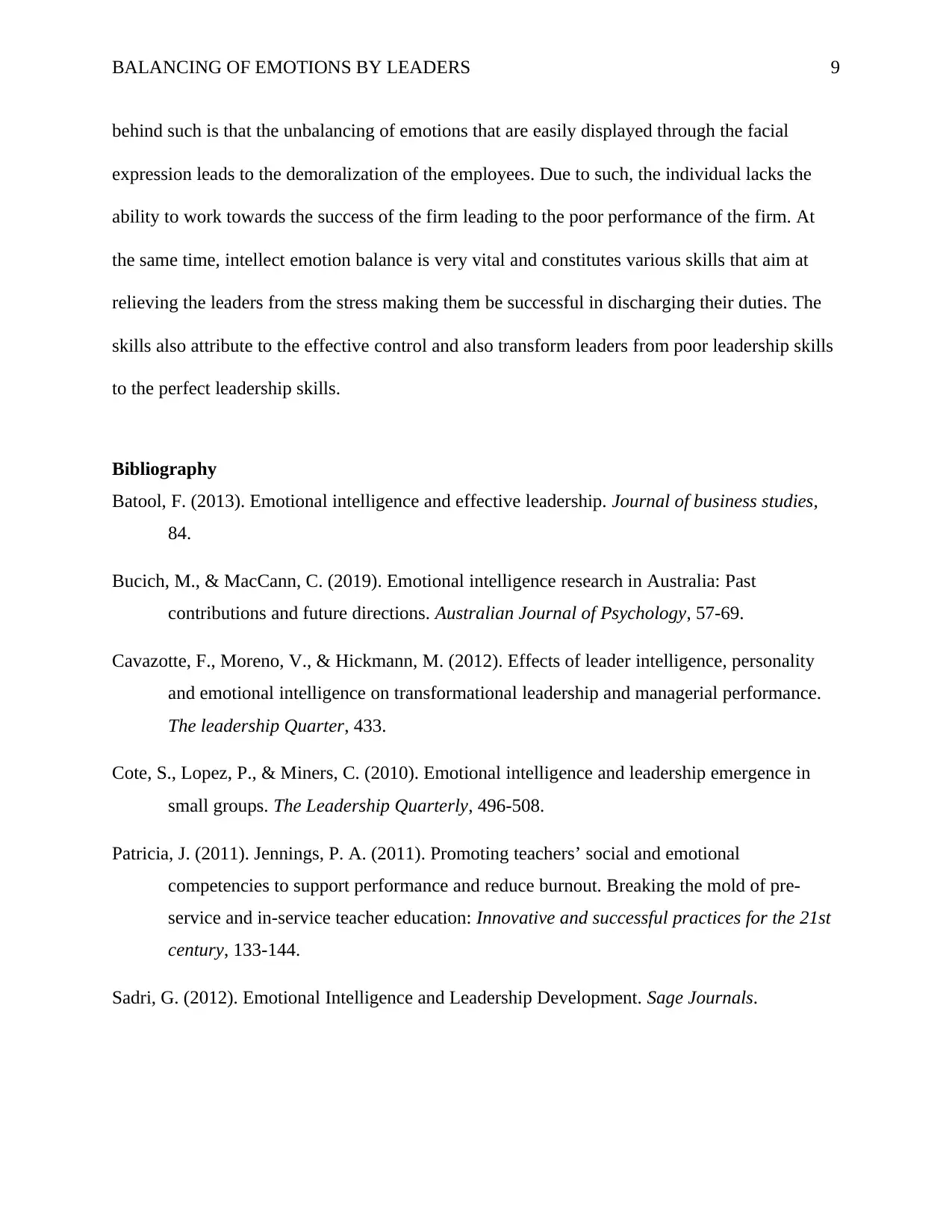
BALANCING OF EMOTIONS BY LEADERS 9
behind such is that the unbalancing of emotions that are easily displayed through the facial
expression leads to the demoralization of the employees. Due to such, the individual lacks the
ability to work towards the success of the firm leading to the poor performance of the firm. At
the same time, intellect emotion balance is very vital and constitutes various skills that aim at
relieving the leaders from the stress making them be successful in discharging their duties. The
skills also attribute to the effective control and also transform leaders from poor leadership skills
to the perfect leadership skills.
Bibliography
Batool, F. (2013). Emotional intelligence and effective leadership. Journal of business studies,
84.
Bucich, M., & MacCann, C. (2019). Emotional intelligence research in Australia: Past
contributions and future directions. Australian Journal of Psychology, 57-69.
Cavazotte, F., Moreno, V., & Hickmann, M. (2012). Effects of leader intelligence, personality
and emotional intelligence on transformational leadership and managerial performance.
The leadership Quarter, 433.
Cote, S., Lopez, P., & Miners, C. (2010). Emotional intelligence and leadership emergence in
small groups. The Leadership Quarterly, 496-508.
Patricia, J. (2011). Jennings, P. A. (2011). Promoting teachers’ social and emotional
competencies to support performance and reduce burnout. Breaking the mold of pre-
service and in-service teacher education: Innovative and successful practices for the 21st
century, 133-144.
Sadri, G. (2012). Emotional Intelligence and Leadership Development. Sage Journals.
behind such is that the unbalancing of emotions that are easily displayed through the facial
expression leads to the demoralization of the employees. Due to such, the individual lacks the
ability to work towards the success of the firm leading to the poor performance of the firm. At
the same time, intellect emotion balance is very vital and constitutes various skills that aim at
relieving the leaders from the stress making them be successful in discharging their duties. The
skills also attribute to the effective control and also transform leaders from poor leadership skills
to the perfect leadership skills.
Bibliography
Batool, F. (2013). Emotional intelligence and effective leadership. Journal of business studies,
84.
Bucich, M., & MacCann, C. (2019). Emotional intelligence research in Australia: Past
contributions and future directions. Australian Journal of Psychology, 57-69.
Cavazotte, F., Moreno, V., & Hickmann, M. (2012). Effects of leader intelligence, personality
and emotional intelligence on transformational leadership and managerial performance.
The leadership Quarter, 433.
Cote, S., Lopez, P., & Miners, C. (2010). Emotional intelligence and leadership emergence in
small groups. The Leadership Quarterly, 496-508.
Patricia, J. (2011). Jennings, P. A. (2011). Promoting teachers’ social and emotional
competencies to support performance and reduce burnout. Breaking the mold of pre-
service and in-service teacher education: Innovative and successful practices for the 21st
century, 133-144.
Sadri, G. (2012). Emotional Intelligence and Leadership Development. Sage Journals.
⊘ This is a preview!⊘
Do you want full access?
Subscribe today to unlock all pages.

Trusted by 1+ million students worldwide
1 out of 9
Related Documents
Your All-in-One AI-Powered Toolkit for Academic Success.
+13062052269
info@desklib.com
Available 24*7 on WhatsApp / Email
![[object Object]](/_next/static/media/star-bottom.7253800d.svg)
Unlock your academic potential
Copyright © 2020–2026 A2Z Services. All Rights Reserved. Developed and managed by ZUCOL.





